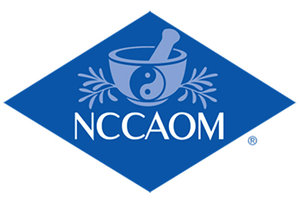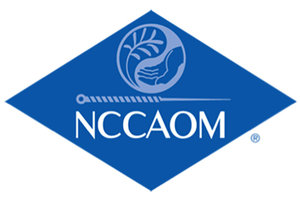Certified Chinese herb practitioners often identify themselves with the credentials "LAc" (Licensed acupuncturist). Very few Chinese herb practitioners utilize the post-nominal letters "Dipl. OM" (Diplomate of Oriental Medicine) or "Dipl. CH" (Diplomate of Chinese Herbology) to indicate their expanded education that includes significant herbal training and testing. Practitioners also don't include "(NCCAOM)" after their credentials, as recommended by the National Certification Commission for Acupuncture and Oriental Medicine (NCCAOM). Credentials and service marks can open new opportunities for practitioners, while also increasing the visibility of the diverse aspects of Chinese medicine.
The Use of NCCAOM in a Signature Line
For decades the field of traditional Chinese medicine has accepted the term "acupuncturist" to reference both acupuncture-only practitioners, and clinicians that combine acupuncture, herbal therapy, nutrition, and Tui-Na into their practice. The title "acupuncturist" may be a useful simplification, but it behooves practitioners who possess additional certifications to present their credentials. A website, business card, and email signature are all great ways to educate patients, with post-nominal designations and service marks. When a practitioner indicates "(NCCAOM)" certification designations and service marks, patients can easily locate the NCCAOM website, which guides them through any questions they have about Chinese medicine and the extensive training required for practitioners. Here is an example of patient education on the NCCAOM website:
"What training does an NCCAOM Diplomate of Oriental medicine have?
Comprehensive training in the traditional differential diagnosis and proper treatment methods requires that a Diplomate of Oriental medicine (NCCAOM) complete three to four academic years of education at the master's degree level in an Oriental medicine program accredited by the Accreditation Commission for Acupuncture and Oriental Medicine (ACAOM). ACAOM is the only accrediting body recognized by the United States Department of Education as the authority for quality education and training in acupuncture and Oriental medicine. In addition to graduation from an ACAOM accredited program, a Diplomate of Oriental medicine (NCCAOM) must demonstrate professional competency by passing NCCAOM certification examinations in Foundations of Oriental Medicine, Acupuncture with Point Location, Chinese Herbology, and Biomedicine.
What is the difference between a Diplomate of Oriental Medicine and other healthcare practitioners who practice acupuncture and/or herbs?
Generally, the NCCAOM Diplomate training and competency verification are in sharp contrast to the acupuncture and Oriental medicine training of other healthcare professionals such as chiropractors or registered nurses or even medical doctors who typically receive 100-300 hours of abbreviated training. In addition, other health care professionals who study acupuncture are not trained or assessed to practice Chinese herbal medicine. Certified (and licensed) acupuncturists and Oriental medicine practitioners are also trained in standard medical history gathering, safety, and ethics, and recognition of when to refer patients to other healthcare professionals or consult with other medical practitioners."
NCCAOM is a reputable public facing certification commission, and their commentary supports practitioners in their work.
How to differentiate Chinese-herb practitioners from acupuncture-only practitioners—many practitioners using the post-nominal letters "LAc" do not have training in Chinese herbal medicine. Practitioners that certify through NCCAOM with Acupuncture, Chinese herbal medicine, and Western sciences invest significantly more time, money, and mind to achieve their additional credentials and service marks. Some integrative medical systems are open to Chinese herb-prescriptions. In many cases, only State-Licensed Acupuncturists, which are Nationally-Board-Certified Practitioners of Oriental Medicine or Chinese Herbology, can administer herb-prescriptions. The practice of acupuncture has made extraordinary headway for Chinese medicine in the United States. A great future lies ahead for Chinese herbs as practitioners adopt labels that illustrate their commitment to the practice of personalized Chinese herbal medicine formulation.
Here are a few NCCAOM credentials to copy. Visit NCCAOM.ORG for more information.
- Diplomate of Chinese Herbology, Licensed Acupuncturist - Dipl. CH (NCCAOM), LAc
- Diplomate of Oriental Medicine, Licensed Acupuncturist - Dipl. OM, (NCCAOM), LAc
- Diplomate of Acupuncture and Chinese Herbology, Licensed Acupuncturist - Dipl. Ac. & CH (NCCAOM), LAc
- Diplomate of Acupuncture, Chinese Herbology, and Asian Bodywork, Licensed Acupuncturist - Dipl. Ac., CH & ABT (NCCAOM), LAc
Service marks provide immediate recognition by the public.


Click here for previous articles by Shellie Rosen, DOM, LAc.




